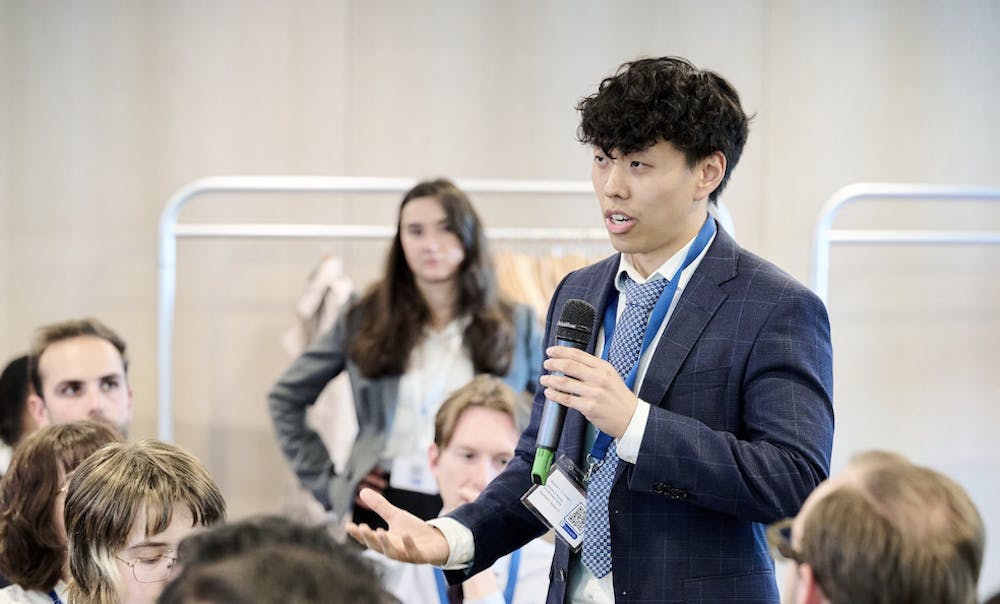Toby Mao is a first-year MD candidate at Stanford and a Fulbright recipient passionate about interdisciplinary approaches to medicine, integrating medical engineering, technology and preventative healthcare. In an interview with The News-Letter, Toby reflected on how his background and passion for global health inspired him to pursue the Fulbright Program, which has shaped his commitment to using artificial intelligence for healthcare innovation.
The News-Letter: What inspired you to apply for the Fulbright program, and was there a defining moment that made you commit to pursuing it?
Toby Mao: I always wanted to experience new cultures. I'm an immigrant myself, so understanding different cultures is really pivotal to my background. Both my Chinese heritage and my U.S. experiences have helped me grow as a person, and I'm always eager to learn about different parts of the world. Honestly, there [was] a bit of luck too. I have a collaborator from my previous lab at Hopkins who is a German cardiologist and a refugee from Syria. He shared a lot about the health issues refugees face in that area. That really inspired me to use my background in AI to democratize access to technology and improve patient triage, making healthcare more accessible and efficient. That's why I decided to pursue Fulbright.
N-L: Could you briefly walk me through your Fulbright project and research focus?
TM: We are using artificial intelligence to simplify healthcare challenges. The problem we're addressing is that the German health system isn't as efficient for immigrants, who often lack access to tertiary care centers with specialized cardiac machines. These machines are essential for mapping out the heart and treating patients, but direct access is limited. We're exploring whether AI can use more accessible inputs, like electrocardiogram signals, and apply machine learning algorithms to predict the location of disease drivers.
N-L: Were there any challenges you faced during your research, and how did you overcome them?
TM: There were times where algorithms failed. Sometimes they didn’t reach the accuracy we had expectations for, or our data processing aspect was not standardized, which could potentially influence the modeling capability of our algorithm, especially with underrepresented demographics. Troubleshooting and problem-solving have been a constant theme throughout these ten months of research.
N-L: How has Hopkins supported your research exploration and independence?
TM: Hopkins has been great at linking students to research and resources. My connection with the German cardiologist came through Hopkins and my [primary investigator’s international collaborations]. A lot of Hopkins professors are like that in this regard. This prepares students for international research outreach. The fellowship office, especially Kathleen Barry, does such a great job connecting students to the right resources. They offer workshops for writing and help you craft your story, which even translated into my medical school application. Hopkins really helps you define your narrative and supports you through the process.
N-L: How has the Fulbright experience shaped your worldview and future work?
TM: I'm grateful for this opportunity. Everyone is limited by their cultural experiences. Growing up in a Chinese household and moving to the U.S., I only saw a small part of the world. Fulbright has helped me understand what's happening elsewhere and realize how privileged I am to be educated at Hopkins and pursuing a graduate degree. For example, I lived among many immigrants and refugees from Syria and the Middle East, and I learned the kind of stories you would hear from the news. Witnessing it in person and hearing the story firsthand from the people who are going through these experiences really help you realize that there are so many changes you can make to this world and how privileged you are. Cultural exchange has truly broadened my perspective.
N-L: What advice do you have for students who want to apply for a scholarship or follow a path like yours in research?
TM: From what I understand about the Fulbright Program, especially on the research side, it's important to be good at what you're doing and have strong grades, but that's not everything. They really look for how well you mesh with the host country's needs. So, it's crucial to research the country you're planning to go to [and also] understand the problems they're facing [to] consider what unique skills or background you have that could help address those problems.
I read a lot of news and talk to people who live in Germany to get a better sense of what's happening, the political landscape and how my background could contribute to solving their problems. My biggest advice for students is to utilize the resources you have. Connect with alumni from previous years and talk about their experiences. Reach out to people on LinkedIn who are currently in the program. The National Fellowship Office does a great job providing resources, so always talk with Barry and the staff there. That would be my advice.





